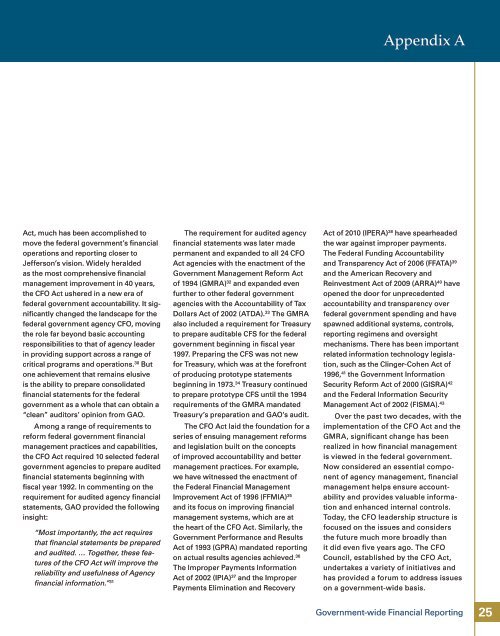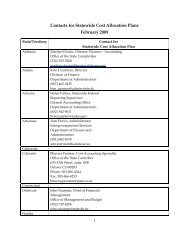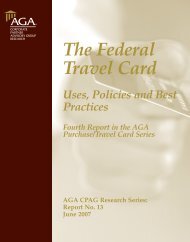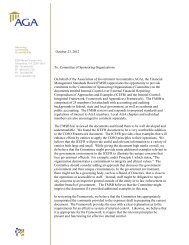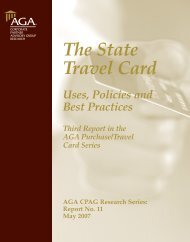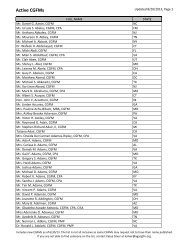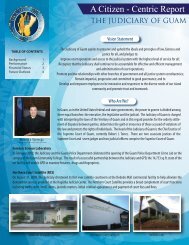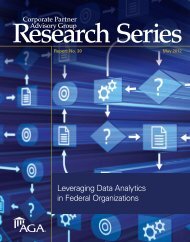Government-wide Financial Reporting - AGA
Government-wide Financial Reporting - AGA
Government-wide Financial Reporting - AGA
You also want an ePaper? Increase the reach of your titles
YUMPU automatically turns print PDFs into web optimized ePapers that Google loves.
Appendix A<br />
Act, much has been accomplished to<br />
move the federal government’s financial<br />
operations and reporting closer to<br />
Jefferson’s vision. Widely heralded<br />
as the most comprehensive financial<br />
management improvement in 40 years,<br />
the CFO Act ushered in a new era of<br />
federal government accountability. It significantly<br />
changed the landscape for the<br />
federal government agency CFO, moving<br />
the role far beyond basic accounting<br />
responsibilities to that of agency leader<br />
in providing support across a range of<br />
critical programs and operations. 30 But<br />
one achievement that remains elusive<br />
is the ability to prepare consolidated<br />
financial statements for the federal<br />
government as a whole that can obtain a<br />
“clean” auditors’ opinion from GAO.<br />
Among a range of requirements to<br />
reform federal government financial<br />
management practices and capabilities,<br />
the CFO Act required 10 selected federal<br />
government agencies to prepare audited<br />
financial statements beginning with<br />
fiscal year 1992. In commenting on the<br />
requirement for audited agency financial<br />
statements, GAO provided the following<br />
insight:<br />
“Most importantly, the act requires<br />
that financial statements be prepared<br />
and audited. … Together, these features<br />
of the CFO Act will improve the<br />
reliability and usefulness of Agency<br />
financial information.” 31<br />
The requirement for audited agency<br />
financial statements was later made<br />
permanent and expanded to all 24 CFO<br />
Act agencies with the enactment of the<br />
<strong>Government</strong> Management Reform Act<br />
of 1994 (GMRA) 32 and expanded even<br />
further to other federal government<br />
agencies with the Accountability of Tax<br />
Dollars Act of 2002 (ATDA). 33 The GMRA<br />
also included a requirement for Treasury<br />
to prepare auditable CFS for the federal<br />
government beginning in fiscal year<br />
1997. Preparing the CFS was not new<br />
for Treasury, which was at the forefront<br />
of producing prototype statements<br />
beginning in 1973. 34 Treasury continued<br />
to prepare prototype CFS until the 1994<br />
requirements of the GMRA mandated<br />
Treasury’s preparation and GAO’s audit.<br />
The CFO Act laid the foundation for a<br />
series of ensuing management reforms<br />
and legislation built on the concepts<br />
of improved accountability and better<br />
management practices. For example,<br />
we have witnessed the enactment of<br />
the Federal <strong>Financial</strong> Management<br />
Improvement Act of 1996 (FFMIA) 35<br />
and its focus on improving financial<br />
management systems, which are at<br />
the heart of the CFO Act. Similarly, the<br />
<strong>Government</strong> Performance and Results<br />
Act of 1993 (GPRA) mandated reporting<br />
on actual results agencies achieved. 36<br />
The Improper Payments Information<br />
Act of 2002 (IPIA) 37 and the Improper<br />
Payments Elimination and Recovery<br />
Act of 2010 (IPERA) 38 have spearheaded<br />
the war against improper payments.<br />
The Federal Funding Accountability<br />
and Transparency Act of 2006 (FFATA) 39<br />
and the American Recovery and<br />
Reinvestment Act of 2009 (ARRA) 40 have<br />
opened the door for unprecedented<br />
accountability and transparency over<br />
federal government spending and have<br />
spawned additional systems, controls,<br />
reporting regimens and oversight<br />
mechanisms. There has been important<br />
related information technology legislation,<br />
such as the Clinger-Cohen Act of<br />
1996, 41 the <strong>Government</strong> Information<br />
Security Reform Act of 2000 (GISRA) 42<br />
and the Federal Information Security<br />
Management Act of 2002 (FISMA). 43<br />
Over the past two decades, with the<br />
implementation of the CFO Act and the<br />
GMRA, significant change has been<br />
realized in how financial management<br />
is viewed in the federal government.<br />
Now considered an essential component<br />
of agency management, financial<br />
management helps ensure accountability<br />
and provides valuable information<br />
and enhanced internal controls.<br />
Today, the CFO leadership structure is<br />
focused on the issues and considers<br />
the future much more broadly than<br />
it did even five years ago. The CFO<br />
Council, established by the CFO Act,<br />
undertakes a variety of initiatives and<br />
has provided a forum to address issues<br />
on a government-<strong>wide</strong> basis.<br />
<strong>Government</strong>-<strong>wide</strong> <strong>Financial</strong> <strong>Reporting</strong> 25


